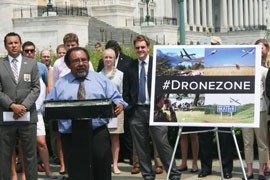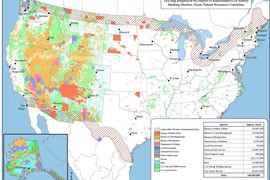Cronkite News has moved to a new home at cronkitenews.azpbs.org. Use this site to search archives from 2011 to May 2015. You can search the new site for current stories.
House votes to ease environmental rules in 100-mile border buffer
WASHINGTON – The House voted Tuesday to relax environmental restrictions in a 100-mile buffer along the nation’s land borders, to make it easier for border patrol agents to do their jobs.
Supporters of the National Security and Federal Lands Protection Act said it is needed to keep the border safe and deter illegal crossing. Currently, they said, agents often have to wait for permission from other federal agencies to patrol, build roads or bring heavy equipment on federal lands.
But critics derided the bill as an overreach that would “supersize” one agency, which had not asked for the authority, and create a 100-mile “drone zone” of government surveillance around the country.
“This is not about securing borders,” said Rep. Raul Grijalva, D-Tucson, in a news conference before Tuesday’s vote. “It’s about loss of law.”
The border bill was one of 14 public lands bills, mostly noncontroversial, that were rolled into one measure for House consideration Tuesday.
The border language would allow Customs and Border Patrol to waive 16 environmental, historic and archaeological laws within 100 miles of the border, including such legislation as the Endangered Species Act, Wilderness Act, Wild and Scenic Rivers Act and Fish and Wildlife Coordination Act.
“This bill specifically protects legal uses, including recreation, and specifically prohibits Border Patrol from limiting public access,” said Rep. Rob Bishop, R-Utah, a lead sponsor of the measure.
He said the bill does nothing more than give border patrol agents “on federal property the same rights they exercise on state property.”
Bishop pared back the list of laws waived under the bill, from its original 36 to 16. The House also amended the bill Tuesday to deny the Border Patrol any additional access to private property and to protect and recognize tribal sovereignty.
Bishop said the 36 laws originally cited in the bill had been identified by the Department of Homeland Security as the “36 laws that they thought could or did impede building that fence” along the border in California. Even at the reduced number, however, Bishop said the bill allows Border Patrol to “do the job for which they are paid to do” without overstepping their bounds.
He said that giving Border Patrol access to more of the border would also keep criminals – who do not care about environmental issues – from desecrating public lands with litter and vandalism and would prevent violence against women he said are raped by the gangs that smuggle them across the border.
But Grijalva said Bishop’s agreement to trim back the bill showed just how overreaching the legislation is.
“The amendment I would have is to strike the whole thing,” Grijalva said after Tuesday’s news conference.
He did, in fact, offer such an amendment but it was defeated on the House floor.
Grijalva said the bill was nothing more than thinly veiled, anti-immigration and anti-environment policy.
“It is cynical to use the tragedy of the border as reason to undo decades of law that have served the American people,” Grijalva said.
The National Wildlife Federation called the border buffer measure an “outright attack on America’s public lands.”
“By allowing border officials to sidestep environmental checks and balances, this provision could turn some of our most wild and scenic public lands into construction sites, crisscrossed with roads and fences,” said Jim Lyon, the federation’s vice president for conservation policy, in a prepared statement.
Rep. Ed Markey, D-Mass., who had joined Grijalva in the morning news conference, said on the House floor that Republicans are using environmental laws as a scapegoat for their “paranoid imagination.”
“People realize environmental laws are not the problem when it comes to border security,” Markey said. “The Bishop amendment proves the underlying bill has always been an extremely harmful solution to a problem that does not exist.”
But Bishop said the bill is necessary to let Border Patrol fulfill its mission and to prevent “terrorists, other illegal aliens, instruments of terrorism, narcotics and other contraband” from passing through the border.
“A sovereign country controls its own borders,” Bishop said. “We are not doing that. We need to.”








